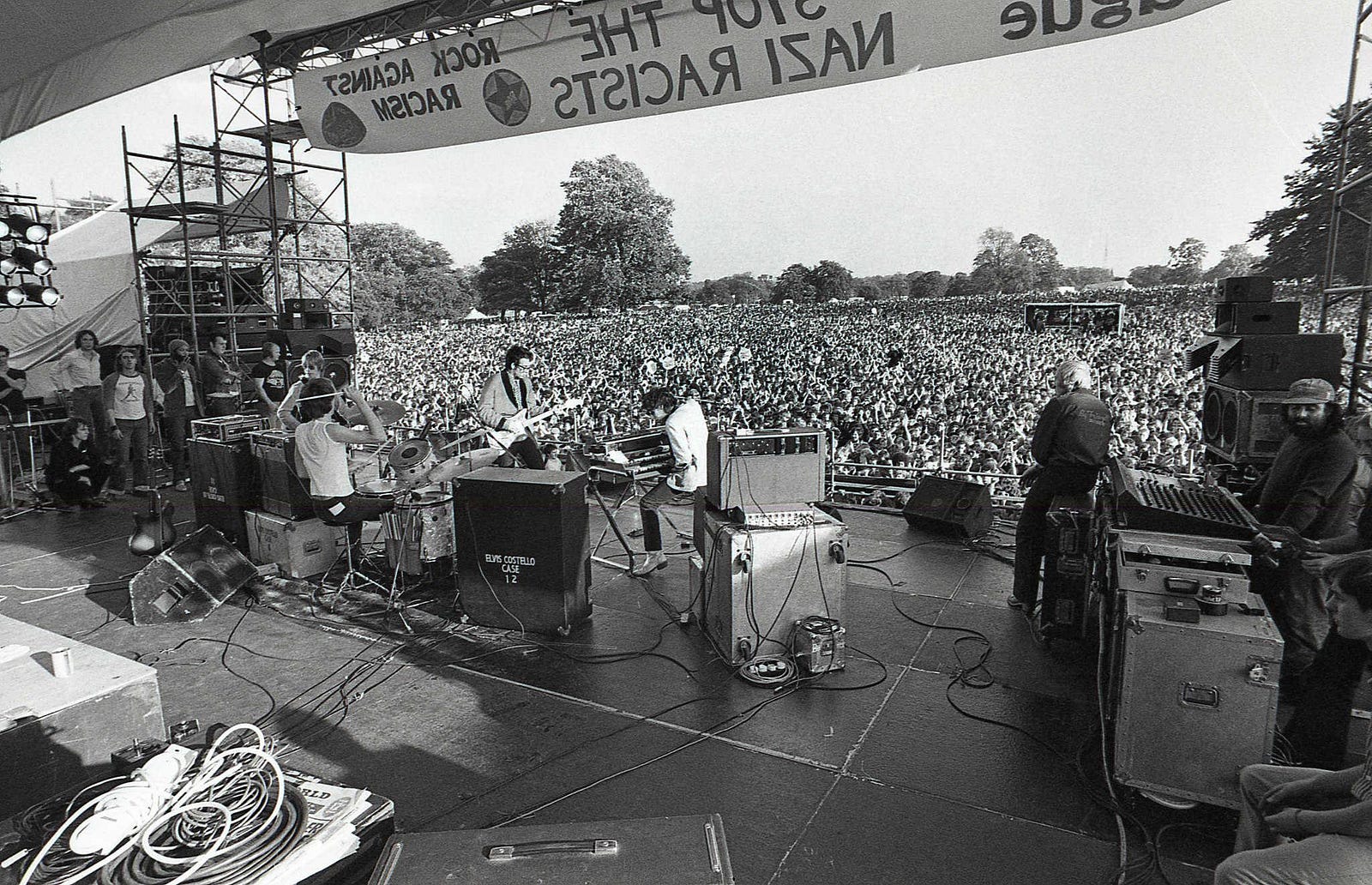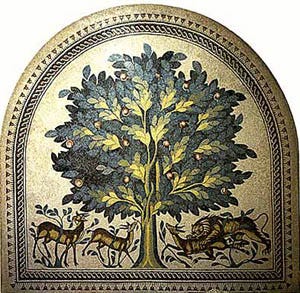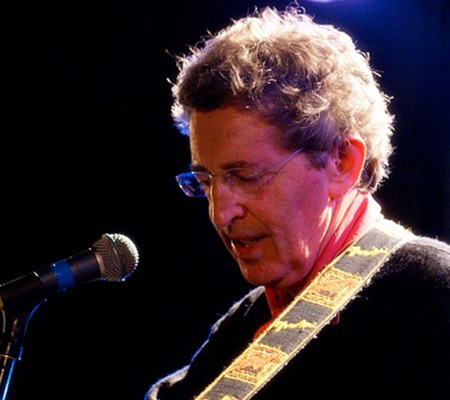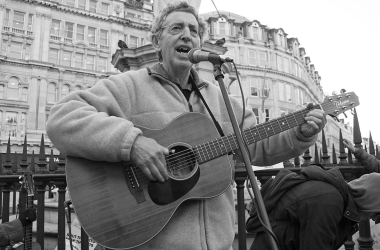By Leon Rosselson
Originally posted on Medium
February 13th, 2018
In
1981, David Widgery, a leading light in the Trotskyist Socialist
Workers Party, wrote an article in New Socialist called, if I remember
rightly, The Rocky Road to Socialism. In it he pronounced the
folk idiom well and truly dead and proclaimed rock music as the true
road to revolution. The argument went like this: a socialist movement
needs a culture for its emotional appeal and, if it is ever to be a
mass movement, it needs a mass culture so that it can mobilise people
who have no interest in political ideology. Rock music is that mass
culture (that was then).Therefore true socialists must march along the
road to revolution in time to the sound of rock. And if you weren’t
persuaded by his reasoning, a quotation from OK authority figures like
Lenin and Walter Benjamin, now rocking away in the other world, should
put you in your place. German socialist artists like Brecht, Heartfield
and Piscator are rapped on the knuckles by Widgery for failing to halt
the rise of fascism, while Hitler gets full marks for his ‘brilliance
at cultural and emotional manipulation-soul massage — as Goebbels called it’.
His article is more than a desperate plea by a terminally frustrated revolutionary. Yes, it is opportunistic, ignores the transitory nature of popular commercial music, sees the the fans who are passionate about this music and the rock bands themselves as pawns to be manipulated in the service of a political agenda –
THE CAPITALIST SYSTEM WAS TODAY OVERTHROWN BY BERT GOEBBELS AND THE SOUL MASSEURS, A FUNKY ROCK GROUP, IN SYMBIOTIC RELATIONSHIP WITH THE LEFT. BERT HIMSELF ADMITTED TO BEING SURPRISED BY THIS OUTCOME AND SAID MODESTLY THAT ALL THEY WERE REALLY TRYING TO DO WAS MAKE THE CHARTS
but it made many valid points: “Our Great Movement” has very nearly succeeded in boring a generation to political death by its narrow definitions of what is political, its enslavement to institutional ritual and its lack of skill and cultural variety in communicating its ideas. It is also a perfect illustration of a long-held belief on the left and in vanguard parties that music, song can be, should be a political weapon to rally the working class, the masses to bring about a better society, to change the world. No doubt the left has all the best songs but, given the state of the world and the working classes, it’s an assumption we should treat with some caution.

Widgery’s article was, in a sense, Trotsky v Stalin Round 99: Music. The Communist Party, after all, had cornered the market in folk music. Or so he believed. Hence his dismissal of folk as ‘deliberately doleful’,‘pre-electronic’ and no longer relevant. In the 1930s in the U.S.A. the Communist Party argued with itself as to whether workers’ choirs or some ill-defined thing called folk music was the likelier to lead the working class onto the barricades. The model for workers’ choirs came from Weimar Germany where Hanns Eisler, a highly sophisticated composer who had studied with Schoenberg, sought to change the world through music. He set didactic texts for workers’ choral societies and wrote, with fellow Communist Bertolt Brecht, Kampflieder, fighting songs, like Song of the United Front and Solidarity Song, whose purpose was to raise consciousness and create workers’ solidarity.
The task of workers’ music will be to remove the sentimentality and pompousness from music, since these sensations divert us from the class struggle. (Eisler)

Eisler & Brecht in 1950
In the end, of course, the Party decreed that folk music was indeed the music of the people, even though it clearly wasn’t. This decision led to an upsurge of politically-conscious ‘folk songs’ and, at the end of the 1930s, to the formation of the Almanac Singers, which included Woody Guthrie and Pete Seeger, whose professed aim was to ‘make and sing songs however and whenever they are needed in the workers’ struggle’. This, it should be made clear, was the workers’ struggle as defined by the U.S. Communist Party, which meant that when Hitler attacked the Soviet Union and the war became a People’s War, the Almanacs dropped their anti-war songs and started singing anti-Hitler songs instead; and when the Party agreed a no-strike clause, union songs like Talking Union, were junked. This occasioned much merriment and satirical comment among other left groupings.

In any event, the barricades remained unbuilt and when the mass popularity of radical folk song came about in the 1960s, it resulted not from working class militancy but from the disaffection of middle class youth. It is arguable how much effect those songs that reflected and energised the youth rebellion of that decade had on political change. They flourished for a time both at the grass roots and, in a soft-centred form, in the market place, at least until the market rendered them obsolescent. The commercial music machine after all had no problem in absorbing, filtering out and repackaging the folk-protest songs of the early 60s and the hippie counter culture music of the West Coast rock bands in the late 60s. The sound of rebellion turned out to be as saleable as any other sound.
By the 1970s and 1980s, the idea that folk song was going to overthrow the capitalist system was looking decidedly quaint. In 1986, the history professor Jesse Lemisch followed the Widgery line by launching a scathing attack in the left-wing magazine The Nation on the left’s espousal of, as he put it, ‘the archaic aesthetic of the folk world’, singling out Pete Seeger and Si Kahn for what he called their inauthenticity. To reach the masses, Lemisch argued, the left had to embrace mass market music.
In Britain, too, the Communist Party espoused folk song as the music that would enthuse the people with a vision of a different sort of world. Ewan MacColl and A.L. Lloyd, the two main begetters of the 1950s’ folk revival, were both, at that time, in or close to the Communist Party. Folk clubs proliferated, many with a left political agenda, new songs were written in the folk form, at a time when the grip by the professionals on commercial music had yet to be loosened, and were the accompaniment to various political campaigns, especially CND and the Aldermaston marches.
In the late 1970s, the debate around music and politics reached fever pitch. Or, at least, became moderately heated. It even infiltrated the academic world inside a book called Media, Politics & Culture: A Socialist View (Macmillan 1979) to which I contributed a chapter. Should socialist musicians (and cultural workers generally) work inside the mass media and the market place in order to reach the maximum number of people; or outside so as not to lose control of their art? In 1977, Music for Socialism was formed, a diverse group of musicians whose aim, like the Almanacs, was ‘to place our capabilities at the service of the struggle of the working class towards socialism’. But as to the sort of music that would bring about that happy outcome, on that there was no agreement. I have a vivid memory of the Music for Socialism Festival held in Battersea Arts Centre. The performers represented the whole spectrum of ’radical’ music, from the hard line marching songs of People’s Liberation Music, the musical arm of a Maoist group, led by Cornelius Cardew, once famous for his avant-garde experimental compositions, to acoustic songwriters like me, to the free form hippyish jazz group Red Balune which featured a man dressed as a janitor playing a broom (making a sweeping statement, as the Times’ reviewer wittily commented). Though self-defined as ‘socialist’, we had nothing in common, musically or politically. After each concert, the audience were invited to voice their criticisms of the performers. A splendid idea, I think. The critical terms used were perhaps not very subtle but they were passionately felt. Anarchist wanker, they charged. Bourgeois sell-out. PLM were accused of being militaristic robots. Bourgeois bollocks, I remember, was aimed at the avant-garde group Henry Cow who took a strongly anti-populist line. Radical politics, they said, had to have a radical language. They objected to Rock Against Racism. To settle for progressive content in a reactionary form marks a real collapse in contemporary art culture, they said. Form and content must advance together. Revolutionary content demands revolutionary form. Listening to Henry Cow and its offshoot Art Bears was a genuinely weird experience.
And then there was punk rock and that was going to challenge the establishment and Red Wedge was going to convince the youth to put their trust in Kinnock, except it didn’t. There are limits to the power of song. Songs can cement people’s beliefs. They can’t change them. Solidarity songs are great for bringing people together in a common cause, for making a community of the already converted but they don’t do much for the unconverted. I don’t believe that political commitment, let alone understanding, comes about in a flash of musical light nor that ingrained beliefs and prejudices and conditioning and attitudes born of everyday experience can be magically transformed by listening to songs, least of all to songs that simply make statements, rhyme arguments or chant slogans.
The debate that has raged over the years about which is the right music to rouse the masses seems now to have no relevance. Widgery’s argument depended largely on the success of Rock against Racism. But rock only works in certain contexts, in large spaces and in the market place, and it works almost exclusively for one age group. It communicates through sounds, repetition and volume rather than words, it gives the hearers no space to think for themselves and allows little room for subtlety, humour, irony, thoughtfulness. As for the Widgery/Lemisch argument that a mass movement needs a mass culture, which means whatever music is selling in the market place, that, in my view, completely misunderstands how commercial music is transmitted and received. The industry that turns people into consumers and music into a product for leisure-time consumption functions like any other capitalist industry. Record companies, publishers, agents, managers invest in a product and expect to see a return on that investment. A group that fails to achieve an adequate return is made redundant. Market forces rule. The music, in any case, is only a part of the package. And the message of the medium is that the words don’t matter. The image matters, the style, the clothes, the charisma, the sound, the beat, the mode of performance, the outward show — these matter. Any significance the words may attempt to carry is inevitably undermined by the medium through which it is transmitted.
‘For me the words are just a carefully manufactured part of the packaging medium of the music.The words are more relevant to the album cover than they are to the songs. (Frank Zappa)
In 2008, David Cameron declared his liking for the Jam’s songs in general and Eton Rifles in particular. Since Eton Rifles was supposed to be an attack on class privilege, this seemed puzzling. ‘Is nothing sacred?‘ asked the Guardian’s John Harris. Paul Weller was bemused. ’He must have an idea what it’s about surely. It’s a shame really that someone didn’t listen to that song and get something else from it and become a socialist leader instead. I was a bit disappointed really.’ Yes, if only Cameron had really listened to the words, he could have become the first socialist leader of the Conservative Party. Of course, he heard the words and knew what it was about. But in that context, what are words, anyway? Just part of the package, aren’t they? ‘I don’t see why the left should be the only ones allowed to listen to protest songs,’ Cameron said. What strains credulity even more is that Ed Vaizey, another Tory MP who loved The Jam and had seen them play, admitted a fondness for the Redskins who were the SWP’s favourite band. What would Widgery have said about that?
Song is an infinitely flexible form and there are ways of challenging the status quo in song without telling audiences what to think and what to do. Songs don’t have to divide audiences into believers and non-believers. Songs are at their most interesting and are most likely to reach out to ’non-political’ audiences if they have at their heart, not issues, messages, abstractions, but people; if they tell stories rather than transmit slogans; if they find the political in the personal (and the other way around); if they communicate through words rather than sounds; if they ask questions rather than give answers; if they allow room for humour, humanity, wit, subtlety, imagination; if they grant audiences space to make up their own minds. Because most people don’t live their lives on the barricades and, as Jesse Lemisch asks in his article, ‘If the left aims only at the didactic, who will chart the human soul?’

Tree of life


